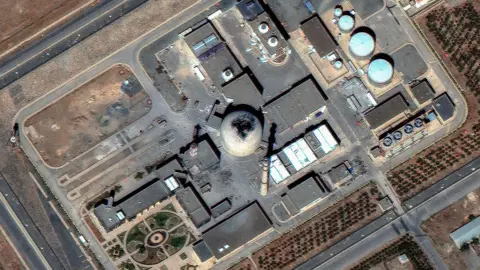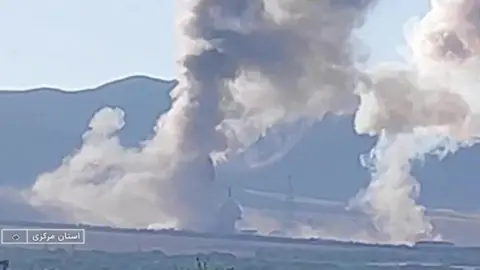 Maxar Technologies/Handout via Reuters
Maxar Technologies/Handout via ReutersIsraeli jets have bombed a nuclear reactor under construction in central Iran during a wave of air strikes on the seventh day of the conflict between the two countries.
The Israeli military said it targeted the Arak heavy water reactor’s core seal to stop it being used for “nuclear weapons development”.
The International Atomic Energy Agency confirmed the reactor was hit and that it contained no nuclear material.
Spent fuel from heavy water reactors contains plutonium suitable for a nuclear bomb.
Iran – which says its nuclear programme is entirely peaceful – agreed under a 2015 deal with world powers to redesign and rebuild Arak so it could not produce weapons-grade plutonium.
The following year, the IAEA said Iran had removed Arak’s calandria, or reactor core, and rendered it “inoperable”.
The global nuclear watchdog’s latest quarterly report from late May said minor civil construction work was ongoing at the reactor, and that Iran expected it to be commissioned this year and to start operating in 2026.
The Israeli military said Iran’s government had “deliberately ordered [workers] not to complete the conversion… in order to exert pressure on the West”.
“The strike targeted the component intended for plutonium production, in order to prevent the reactor from being restored and used for nuclear weapons development,” it added.
Black-and-white aerial footage of the attack released by the military appeared to show a bomb hitting the domed roof of the reactor building and several large explosions from Arak, which about 250km (155 miles) south-west of Tehran and is also known as Khondab.
Daytime video broadcast by Iranian state TV showed two large plumes of white smoke rising from the facility. It also cited Iranian officials as saying that the site had been “secured in advance” and that there was “no contamination resulting from the attack”.
Satellite imagery showed a large hole in the reactor building’s roof.
Also visible were what analysts identified as destroyed distillation towers belonging to the adjacent heavy water production plant. The IAEA said it had no information indicating that the heavy water plant was hit.
 Reuters
ReutersThe Israeli military also announced on Thursday that its fighter jets had struck a “nuclear weapons development site” at Natanz.
It is the location of Iran’s main plant producing enriched uranium, which is used to make reactor fuel for power stations but, if further enriched, can be used in nuclear weapons.
The first wave of Israeli strikes last Friday destroyed the above-ground part of Natanz’s Pilot Fuel Enrichment Plant (PFEP), where cascades of centrifuges were enriching uranium, as well as electricity infrastructure at the site.
Rafael Grossi, the IAEA director general, told the BBC on Monday that while there was no sign of a physical attack on the underground centrifuge hall at Natanz, the sudden loss of power was likely to have severely damaged, if not destroyed, the centrifuges operating there.
Four buildings were destroyed in a separate attack on Friday on the Isfahan Nuclear Technology Centre, he said. But very little, if any, damage was visible at Iran’s underground enrichment plant at Fordo, he added.
President Donald Trump is said to be weighing up whether the US should participate in a strike on Fordo because it is the only country with a conventional bomb large enough to destroy it. Sources told the BBC’s US partner CBS News that his mindset was that disabling the facility was necessary.
In 2018, Trump abandoned the nuclear deal with Iran, saying it did too little to stop its pathway to a bomb, and reinstated US sanctions that crippled the Iranian economy.
Iran retaliated by increasingly breaching the restrictions – particularly those relating to the production of enriched uranium.
In its quarterly report, the IAEA expressed concern that Iran had amassed enough uranium enriched up to 60% purity – a short, technical step away from weapons grade, or 90% – to potentially make nine nuclear bombs.
Benjamin Netanyahu, Israel’s prime minister, said on Friday that it was targeting the Iranian nuclear programme because “if not stopped, Iran could produce a nuclear weapon in a very short time”. He did not provide any evidence.
Abbas Araghchi, Iran’s foreign minister, said on Sunday that Israel had “crossed a new red line in international law” by attacking nuclear sites. He also insisted that Iran’s doctrine was “rooted in our belief in the prohibition and illegitimacy of nuclear weapons”.
Israel is widely believed to have nuclear weapons, although it neither confirms nor denies this.
The Israeli air strikes have also destroyed Iranian military facilities and weapons, and killed senior military commanders and nuclear scientists.
Iran’s health ministry said on Sunday that at least 224 people had been killed, but a human rights group put the unofficial death toll at 639 on Thursday.
Iran has launched hundreds of ballistic missiles at Israel in response to the air strikes that have killed at least 24 people, according to the prime minister’s office.
